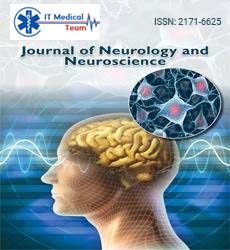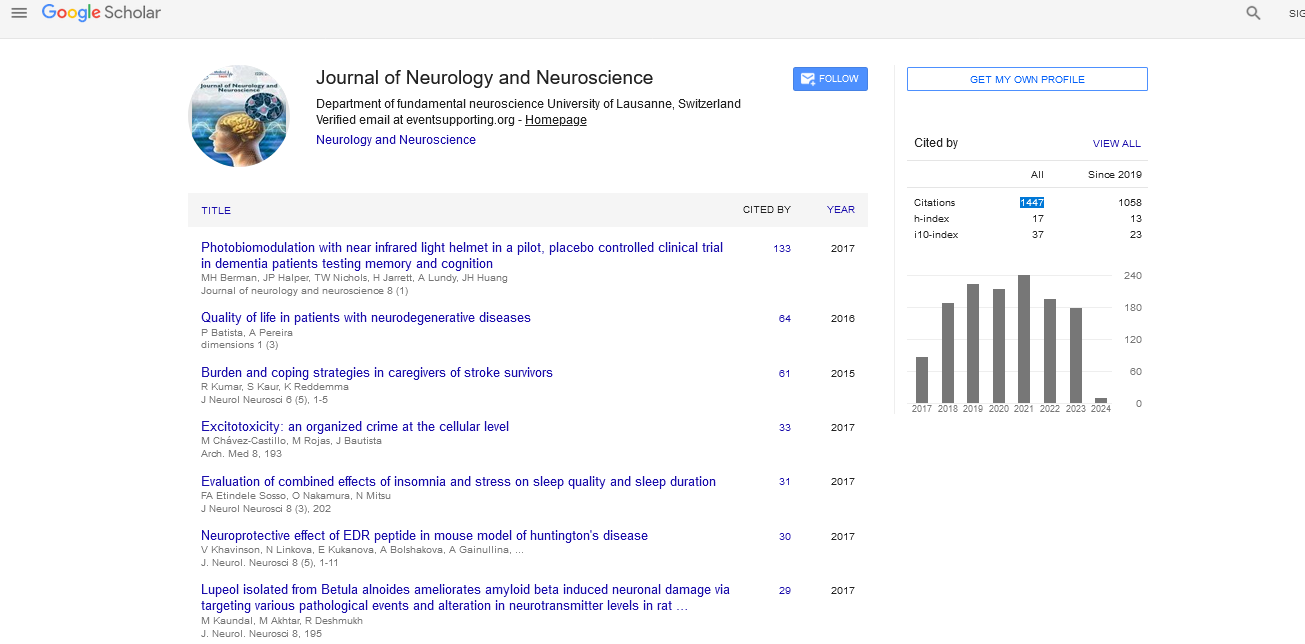Perspective - (2024) Volume 15, Issue 1
Neurocognitive alterations in COVID-19 depression patients
Marione Levina*
Department of Radiology, University of Washington, Seattle, USA
*Correspondence:
Marione Levina, Department of Radiology, University of Washington, Seattle,
USA,
Email:
Received: 01-Feb-2024, Manuscript No. ipjnn-24-14845;
Editor assigned: 03-Feb-2024, Pre QC No. p-14845;
Reviewed: 14-Feb-2024, QC No. Q-14845;
Revised: 21-Feb-2024, Manuscript No. R-14845;
Published:
27-Feb-2024
Introduction
The COVID-19 pandemic has brought about not
only physical health challenges but also a surge in mental
health issues, including depression. Amidst the plethora
of psychological manifestations, understanding the
neurocognitive alterations in COVID-19 depression
patients has emerged as a critical area of research. This paper
delves into the intricate interplay between COVID-19
infection, depression, and neurocognitive functions,
exploring the underlying mechanisms, clinical implications,
and potential therapeutic interventions. The COVID-19
pandemic has not only posed significant challenges to
global public health but has also profoundly impacted
mental well-being. Depression, characterized by persistent
feelings of sadness, hopelessness, and loss of interest,
has become increasingly prevalent among individuals
affected by the pandemic. Beyond the emotional turmoil,
emerging evidence suggests that COVID-19 infection
may also lead to neurocognitive alterations, exacerbating
the burden on affected individuals. Understanding the
intricate relationship between COVID-19, depression, and
neurocognitive functions is crucial for devising effective
intervention strategies and improving patient outcomes [1].
COVID-19 infection triggers a systemic inflammatory
response, leading to the release of pro-inflammatory
cytokines. These cytokines can penetrate the blood-brain
barrier, affecting neurotransmitter function and neuronal
integrity, thereby contributing to depressive symptoms and
cognitive impairments. Dysregulation of neurotransmitters,
particularly serotonin, dopamine, and noradrenaline, is
implicated in both depression and cognitive dysfunction.
COVID-19-induced alterations in neurotransmitter levels
may exacerbate depressive symptoms and cognitive deficits
in affected individuals. Emerging evidence suggests that
COVID-19 infection may accelerate neurodegenerative
processes, such as tau hyperphosphorylation and amyloid
beta accumulation, predisposing individuals to cognitive
decline and dementia, particularly in the context of
depression. COVID-19 depression patients often exhibit
deficits in executive functions, including working memory,
attentional control, and cognitive flexibility. These
impairments can significantly impact daily functioning and
quality of life.
Description
Both episodic and semantic memory deficits have
been reported in COVID-19 depression patients, with impairments in memory encoding, consolidation, and
retrieval processes. These deficits may contribute to cognitive
complaints and functional impairment. COVID-19
depression patients may demonstrate attentional biases
towards negative stimuli, reflecting heightened sensitivity
to threat and rumination. These attentional biases can
perpetuate depressive symptoms and impair cognitive
performance. The neurocognitive alterations observed in
COVID-19 depression patients pose challenges for accurate
diagnosis and treatment planning. Clinicians must carefully
evaluate cognitive functioning alongside psychiatric
symptoms to provide comprehensive care. Neurocognitive
impairments in COVID-19 depression patients may
contribute to treatment resistance, necessitating tailored
therapeutic approaches. Integrating cognitive remediation
techniques with standard antidepressant treatments may
improve outcomes in this population [2,3].
The long-term prognosis of COVID-19 depression
patients with neurocognitive alterations remains
uncertain, highlighting the need for longitudinal studies
to elucidate disease trajectories and identify prognostic
markers. Targeting neuroinflammatory pathways and
neurotransmitter systems may attenuate both depressive
symptoms and cognitive deficits in COVID-19 depression
patients. Anti-inflammatory agents, such as cytokine
inhibitors, and neuromodulatory drugs, such as Selective
Serotonin Reuptake Inhibitors (SSRIs) and NMDA receptor
antagonists, hold promise as adjunctive treatments [4,5].
Conclusion
Cognitive remediation interventions, including
cognitive training, psychoeducation, and mindfulnessbased
therapies, may enhance cognitive functioning and
alleviate depressive symptoms in COVID-19 depression
patients. These interventions can promote neuroplasticity
and adaptive coping strategies, facilitating recovery and
rehabilitation. The neurocognitive alterations observed
in COVID-19 depression patients represent a complex
interplay between viral pathophysiology, inflammatory
processes, and psychiatric manifestations. Understanding
the underlying mechanisms and clinical implications of
these alterations is crucial for optimizing patient care and
improving outcomes. Moving forward, interdisciplinary
research efforts aimed at unraveling the intricacies of
neurocognitive dysfunction in COVID-19 depression
patients will be essential for developing targeted therapeutic
interventions and mitigating the long-term impact of the
pandemic on mental health.
Acknowledgement
None.
Conflict of Interest
None.
References
- Soriano JB, Murthy S, Marshall JC, Relan P and Diaz JV. A clinical case definition of post-COVID-19 condition by a delphi consensus. Lancet Infect Dis. 2022; 22(4):e102-107.
Google Scholar, Crossref, Indexed at
- Ceban F, Ling S, Lui LM, Lee Y and Gill H, et al. Fatigue and cognitive impairment in post-COVID-19 syndrome: A systematic review and meta-analysis. Brain Behav Immun. 2022; 101:93-135.
Google Scholar, Crossref, Indexed at
- Taquet M, Geddes JR, Husain M, Luciano S and Harrison PJ. 6-month neurological and psychiatric outcomes in 236 379 survivors of COVID-19: A retrospective cohort study using electronic health records. Lancet Psychiatry. 2021; 8(5):416-427.
Google Scholar, Crossref, Indexed at
- Simonetti A, Bernardi E, Margoni S, Catinari A and Restaino A, et al. Mixed depression in the post-COVID-19 syndrome: Correlation between excitatory symptoms in depression and physical burden after COVID-19. Brain Sci. 2023; 13(4):688.
Google Scholar, Crossref, Indexed at
- Brown LA, Ballentine E, Zhu Y, McGinley EL and Pezzin L, et al. The unique contribution of depression to cognitive impairment in post-acute sequelae of SARS-CoV-2 infection. Brain Behav Immun Health. 2022; 22:100460.
Google Scholar, Crossref, Indexed at





